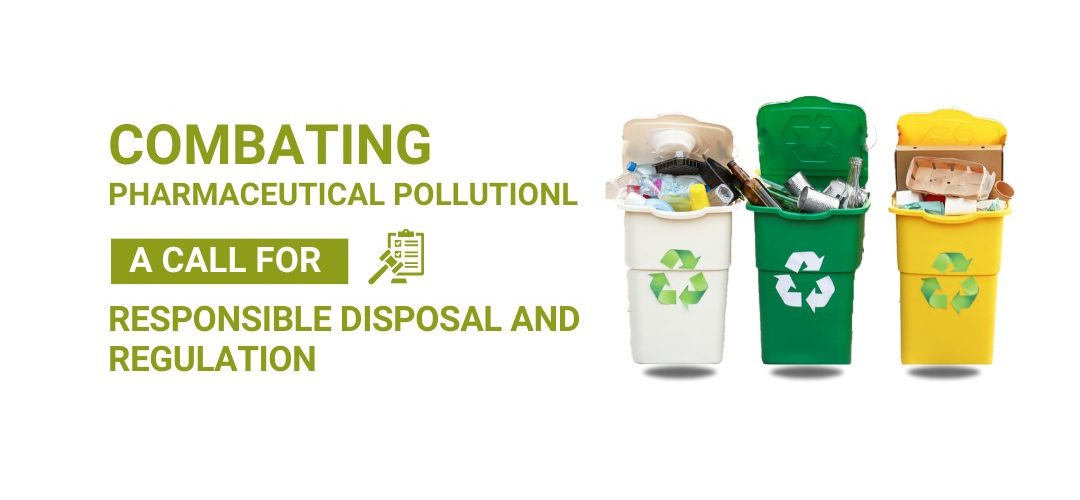Introduction:
Pharmaceutical pollution has become a pressing environmental issue with severe consequences on human health, aquatic life, sewage treatment systems, drinking water, and the overall environment. This blog explores the key causes of pharmaceutical pollution and its detrimental effects, while proposing practical solutions to mitigate its impact.
Causes of Pharmaceutical Pollution:
- Drug Ingestion and Excretion: When organisms consume pharmaceuticals, their bodies metabolize and expel the leftover waste products, which eventually find their way into the environment through urine and fecal matter.
- Healthcare Institutions Disposal: Hospitals and healthcare facilities contribute significantly to pharmaceutical pollution due to inadequate disposal practices that may not align with proper standards.
- Drug Manufacturers: Some drug manufacturers dispose of excess drugs in landfills or flush them, leading to pollution through wastewater runoff.
- Domestication of Animals: Drugs fed to domesticated animals are not always entirely metabolized, resulting in the excretion of excess pharmaceuticals.
- Agricultural Products: Insecticides sprayed on agricultural products can contaminate the surrounding environment.
- Domestic Drug Use and Disposal Behavior: Improper disposal of pharmaceutical and personal care products by consumers results in the pollution of streams, groundwater, lakes, and rivers, compounded by the presence of expired medications in households.
Effects of Pharmaceutical Pollution:
- On Human Health: Drug resistance is a growing concern, making it harder to combat diseases like tuberculosis, HIV, and malaria. Improper use and overuse of antibiotics contribute to drug-resistant infections, posing a significant threat to global health.
- On Aquatic Life: Estrogen-like substances in pharmaceuticals can disrupt fish populations, altering female-to-male ratios and feminizing male fish. Additionally, antidepressants have been found in the brain tissue of fish living downstream of wastewater treatment facilities.
- On Sewage Treatment Systems: Antibiotics used in treating infections can interfere with sewage treatment processes and harm the microbial ecology of surface water. Nitrifying bacteria can be significantly affected, impacting the decomposition of organic matter.
- On Drinking Water: Pharmaceutical compounds enter waterways and persist in drinking water due to inadequate removal by sewage treatment systems. This can lead to potential health issues for humans.
- On Environment: Some pharmaceutical substances can remain in water and air for extended periods, affecting the environment when their concentrations reach critical levels. Persistent and pseudo-persistent medications pose long-term risks.
Way Forward:
- Proper Drug Disposal: Implementing public education initiatives on drug disposal and supporting drug take-back programs can encourage responsible disposal practices, safeguarding the environment.
- Proper Regulation: Robust regulations are necessary to prevent large-scale medicine flushing in healthcare institutions and ensure proper disposal methods are adhered to.
- Investment in Research and Development: Investing in research and technological advancements for pharmaceutical disposal can lead to more efficient and sustainable solutions.
- Limiting Waste and Bulk Purchases: Encouraging individuals and companies to avoid bulk purchases of pharmaceuticals can reduce waste and prevent excess medication disposal.
Conclusion:
Pharmaceutical pollution is a complex issue with far-reaching consequences for the environment and human health. Addressing the causes and effects of this pollution requires a collaborative effort from individuals, healthcare institutions, manufacturers, and regulatory bodies. By adopting responsible drug disposal practices and implementing proper regulations, we can work towards minimizing pharmaceutical pollution and preserving our planet’s health for future generations.
ProIndia is a consulting firm that helps businesses and organizations achieve their sustainability goals. They offer a variety of services, including:
- EPR audit and compliance: ProIndia can help businesses to comply with the Extended Producer Responsibility (EPR) regulations in India by quick and smooth transfer of credits.
- ESG consulting: ProIndia can help businesses to develop and implement ESG (Environmental, Social, and Governance) strategies.
- Social impact: ProIndia works with businesses and organizations to create social impact through their sustainability initiatives.
Blog by : Yaseen Muneer
PRO India



